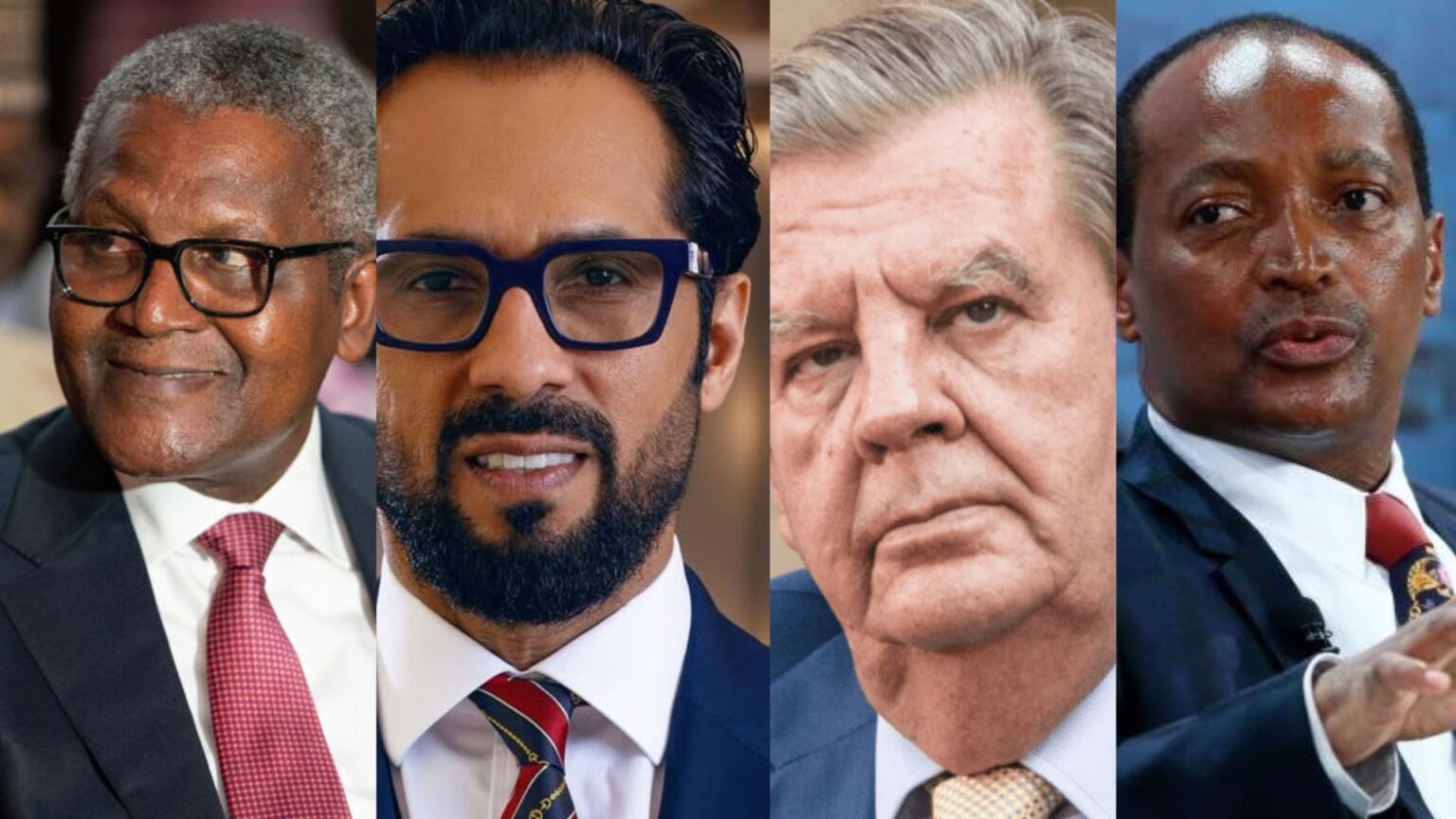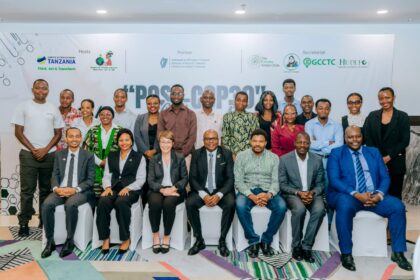Africa’s wealthiest individuals remain rooted in old industries — cement, telecoms, diamonds and construction — according to Forbes’ 2025 Africa Billionaires List. Despite global economic turbulence, the continent’s richest are growing wealthier, with Nigeria’s Aliko Dangote once again standing tall at the summit, his fortune now worth an estimated $23.9 billion.
- 1. Aliko Dangote — $23.9 Billion (Nigeria)
- 2. Johann Rupert — $14 Billion (South Africa)
- 3. Nicky Oppenheimer — $10.4 Billion (South Africa)
- 4. Nassef Sawiris — $9.6 Billion (Egypt)
- 5. Mike Adenuga — $6.8 Billion (Nigeria)
- 6. Abdulsamad Rabiu — $5.1 Billion (Nigeria)
- 7. Naguib Sawiris — $5 Billion (Egypt)
- 8. Koos Bekker — $3.4 Billion (South Africa)
- 9. Mohamed Mansour — $3.4 Billion (Egypt)
- 10. Patrice Motsepe — $3 Billion (South Africa)
- 11. Issad Rebrab — $3 Billion (Algeria)
- 12. Mohammed Dewji — $2.2 Billion (Tanzania)
- 13. Michiel Le Roux — $2.2 Billion (South Africa)
- 14. Othman Benjelloun — $1.6 Billion (Morocco)
- 15. Anas Sefrioui — $1.6 Billion (Morocco)
Collectively, the 15 billionaires on this year’s list are worth over $90 billion, underscoring both the resilience of traditional sectors and the persistent concentration of wealth in just a handful of hands.
1. Aliko Dangote — $23.9 Billion (Nigeria)
Age: 68 | Industry: Cement, sugar
For the fourteenth consecutive year, Aliko Dangote retains his title as Africa’s richest man. His conglomerate, the Dangote Group, dominates cement and sugar production across West Africa, and his multi-billion-dollar oil refinery — inaugurated in Lagos — signals his deepening influence in energy. Dangote’s wealth rose slightly from last year as cement demand recovered across Nigeria and the region.
2. Johann Rupert — $14 Billion (South Africa)
Age: 75 | Industry: Luxury goods
The chairman of Richemont, the Swiss-based parent of Cartier and Montblanc, Johann Rupert represents Africa’s luxury empire. His fortune, tied to European markets, benefitted from strong global sales of high-end watches and jewellery. Despite South Africa’s sluggish economy, Rupert’s wealth highlights the global reach of African-rooted enterprises.
3. Nicky Oppenheimer — $10.4 Billion (South Africa)
Age: 80 | Industry: Diamonds
Once at the helm of De Beers, Oppenheimer sold his family’s stake to Anglo American in 2012 but continues to profit through investments in conservation and aviation. The Oppenheimer name remains synonymous with South Africa’s diamond legacy — and with a quiet, enduring influence on both business and philanthropy.
4. Nassef Sawiris — $9.6 Billion (Egypt)
Age: 64 | Industry: Construction, investments
Egypt’s richest man, Nassef Sawiris, oversees OCI N.V., a leading global fertilizer producer, and holds a stake in Adidas. His wealth reflects Egypt’s diversified industrial power and a growing presence in European markets.
5. Mike Adenuga — $6.8 Billion (Nigeria)
Age: 72 | Industry: Telecom, oil
From building Globacom, Nigeria’s second-largest mobile network, to investing in oil exploration through Conoil, Mike Adenuga has turned tenacity into billions. His wealth surged amid a rebound in telecom revenues and rising oil prices, securing his position as one of Africa’s most dynamic self-made billionaires.
6. Abdulsamad Rabiu — $5.1 Billion (Nigeria)
Age: 65 | Industry: Cement, sugar
A close rival to Dangote, Abdulsamad Rabiu leads the BUA Group, spanning cement, sugar and food processing. His company’s expansion into northern Nigeria has boosted employment and regional trade, making him a key figure in West Africa’s industrialisation story.
7. Naguib Sawiris — $5 Billion (Egypt)
Age: 71 | Industry: Telecom
Brother to Nassef, Naguib Sawiris made his fortune through Orascom Telecom before selling to Veon. He remains active in global investment, from media to mining, and continues to represent Egypt’s entrepreneurial influence beyond its borders.
8. Koos Bekker — $3.4 Billion (South Africa)
Age: 72 | Industry: Media, investments
The man behind Naspers’ transformation into a global tech investor, Koos Bekker turned a South African media firm into a digital powerhouse through early stakes in China’s Tencent. His wealth remains tied to global tech valuations, illustrating Africa’s quiet role in the global digital economy.
9. Mohamed Mansour — $3.4 Billion (Egypt)
Age: 77 | Industry: Diversified
A former transport minister and head of the Mansour Group, he runs one of Egypt’s largest family businesses, spanning automotive, retail and energy. Mansour’s interests range from Caterpillar machinery distribution to consumer products, anchoring him among Africa’s corporate heavyweights.
10. Patrice Motsepe — $3 Billion (South Africa)
Age: 63 | Industry: Mining
Founder of African Rainbow Minerals, Patrice Motsepe remains a symbol of black economic empowerment in post-apartheid South Africa. Now president of the Confederation of African Football (CAF), his influence extends far beyond mining, reflecting the growing intersection between business and sport.
11. Issad Rebrab — $3 Billion (Algeria)
Age: 81 | Industry: Food
Algeria’s only billionaire, Issad Rebrab built Cevital, one of North Africa’s largest privately held companies, specialising in sugar, food processing and steel. His empire is a rare example of large-scale private enterprise thriving in a tightly controlled economy.
12. Mohammed Dewji — $2.2 Billion (Tanzania)
Age: 50 | Industry: Diversified
Tanzania’s youngest billionaire, Mohammed Dewji, transformed his family business into a manufacturing and distribution giant under the MeTL Group. Known for his hands-on leadership and philanthropic work, Dewji remains one of East Africa’s most recognisable business figures.
13. Michiel Le Roux — $2.2 Billion (South Africa)
Age: 76 | Industry: Banking
Founder of Capitec Bank, Le Roux revolutionised South Africa’s banking sector with simplified services for low-income clients. His inclusion underscores the strength of the financial sector even amid South Africa’s economic challenges.
14. Othman Benjelloun — $1.6 Billion (Morocco)
Age: 92 | Industry: Banking, insurance
A titan of Moroccan finance, Othman Benjelloun heads BMCE Bank and RMA Watanya, his family-controlled insurance firm. At 92, he’s one of the oldest billionaires on the list — a testament to longevity in leadership and legacy.
15. Anas Sefrioui — $1.6 Billion (Morocco)
Age: 68 | Industry: Real estate
A self-made property mogul, Anas Sefrioui leads Groupe Addoha, Morocco’s major affordable-housing developer. His fortune stems from urban expansion and real-estate demand across North Africa.
Africa’s 2025 billionaire list reveals a striking pattern: the continent’s wealth remains highly concentrated both geographically and sectorally. South Africa, Nigeria, and Egypt dominate, collectively home to more than two-thirds of the continent’s billionaires.
While Africa’s start-up scene and fintech hubs in Lagos and Nairobi are gaining global attention, its billionaire class still draws heavily from traditional industries such as cement, mining, telecoms, and banking.
Several of these fortunes were built decades ago yet continue to grow in modern economies. In a continent facing youth unemployment, inflation, and currency volatility, such wealth stands as both a source of national pride and a reminder of inequality.
Still, many of these billionaires are increasingly investing in philanthropy and green energy, showing a gradual shift toward socially responsible capitalism.
As global markets evolve, the question remains: will Africa’s next generation of billionaires emerge from factories and oil fields — or from code and creativity?














